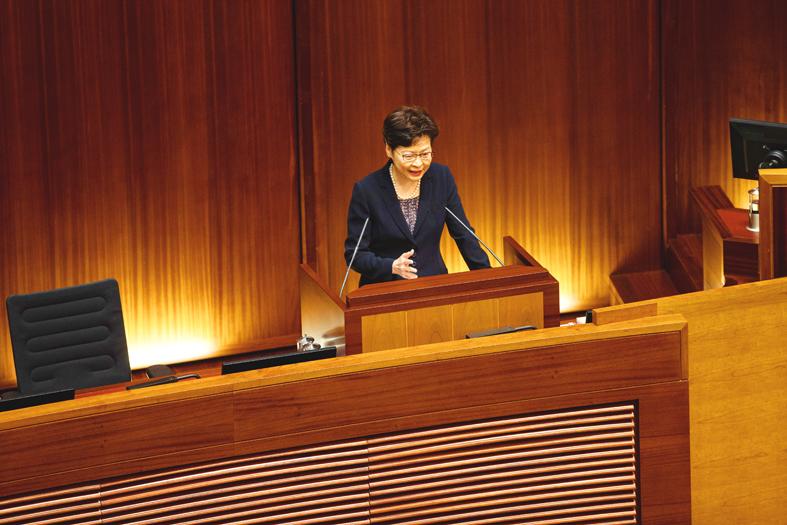Hong Kong yesterday passed a new immigration law that includes powers to stop people entering or leaving the territory.
The bill sailed through the Hong Kong Legislative Council.
Rights advocates, lawyers and some business figures have sounded the alarm over provisions within the bill, including one that allows the territory’s immigration officials to bar people from boarding planes to and from Hong Kong.

Photo: EPA-EFE
No court order is required and there is no recourse to appeal.
The Hong Kong Bar Association said that the bill’s wording gave “apparently unfettered power” to the immigration director.
Speaking after the bill was passed, labor rights advocates and lawyers said that the Legislative Council had ignored concerns about the law’s broad wording.
“When they have this power, absolute power, you don’t know who they will use it on,” barrister Chow Hang-tung (鄒幸彤), a member of the Hong Kong Alliance, told reporters after the bill was passed.
The Hong Kong government said that the bill was needed to address a backlog of non-refoulement claims and to screen illegal immigrants before they depart for the territory.
“It will only apply to flights heading to Hong Kong,” the Hong Kong Security Bureau said.
So-called “exit bans” are often used in mainland China against people who challenge authorities.
Separately, Chinese social groups, enterprises and public entities are to have increased responsibility to combat foreign espionage under new regulations issued on Monday by the Chinese Ministry of State Security.
According to state media, state security would work with other government departments to “adjust” the list of groups susceptible to foreign espionage and to develop measures to safeguard against it, including Chinese Communist Party and state organs, social groups, enterprises and public institutions.
Once organizations are designated as having anti-espionage responsibility, state security would provide “guidance, supervision and inspection” of their efforts, including personnel vetting, and strict training, monitoring and debriefing for staff trips overseas, reports said.
Such organizations must report suspicions and incidents to authorities.
The rules were unveiled amid increasing public campaigns to watch out for foreign spies, which state media have warned could be an “intimate lover” or “an online friend with the same interests.”
Additional reporting by the Guardian

A magnitude 5.6 earthquake struck off the coast of Yilan County at 12:37pm today, with clear shaking felt across much of northern Taiwan. There were no immediate reports of damage. The epicenter of the quake was 16.9km east-southeast of Yilan County Hall offshore at a depth of 66.8km, Central Weather Administration (CWA) data showed. The maximum intensity registered at a 4 in Yilan County’s Nanao Township (南澳) on Taiwan’s seven-tier scale. Other parts of Yilan, as well as certain areas of Hualien County, Taipei, New Taipei City, Taoyuan, Hsinchu County, Taichung and Miaoli County, recorded intensities of 3. Residents of Yilan County and Taipei received

Taiwan has secured another breakthrough in fruit exports, with jujubes, dragon fruit and lychees approved for shipment to the EU, the Ministry of Agriculture said yesterday. The Animal and Plant Health Inspection Agency on Thursday received formal notification of the approval from the EU, the ministry said, adding that the decision was expected to expand Taiwanese fruit producers’ access to high-end European markets. Taiwan exported 126 tonnes of lychees last year, valued at US$1.48 million, with Japan accounting for 102 tonnes. Other export destinations included New Zealand, Hong Kong, the US and Australia, ministry data showed. Jujube exports totaled 103 tonnes, valued at

TRUST: The KMT said it respected the US’ timing and considerations, and hoped it would continue to honor its commitments to helping Taiwan bolster its defenses and deterrence US President Donald Trump is delaying a multibillion-dollar arms sale to Taiwan to ensure his visit to Beijing is successful, a New York Times report said. The weapons sales package has stalled in the US Department of State, the report said, citing US officials it did not identify. The White House has told agencies not to push forward ahead of Trump’s meeting with Chinese President Xi Jinping (習近平), it said. The two last month held a phone call to discuss trade and geopolitical flashpoints ahead of the summit. Xi raised the Taiwan issue and urged the US to handle arms sales to

BIG SPENDERS: Foreign investors bought the most Taiwan equities since 2005, signaling confidence that an AI boom would continue to benefit chipmakers Taiwan Semiconductor Manufacturing Co’s (TSMC, 台積電) market capitalization swelled to US$2 trillion for the first time following a 4.25 percent rally in its American depositary receipts (ADR) overnight, putting the world’s biggest contract chipmaker sixth on the list of the world’s biggest companies by market capitalization, just behind Amazon.com Inc. The site CompaniesMarketcap.com ranked TSMC ahead of Saudi Aramco and Meta Platforms Inc. The Taiwanese company’s ADRs on Tuesday surged to US$385.75 on the New York Stock Exchange, as strong demand for artificial intelligence (AI) applications led to chip supply constraints and boost revenue growth to record-breaking levels. Each TSMC ADR represents